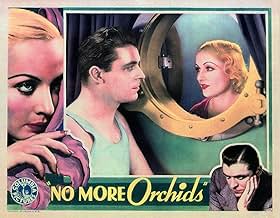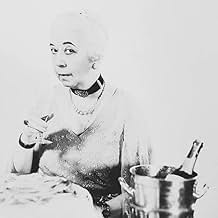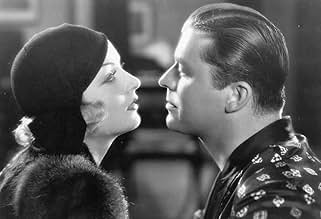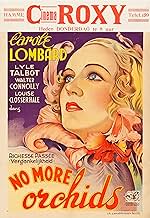अपनी भाषा में प्लॉट जोड़ेंAn heiress forced to marry into royalty in order to save her banker father falls in love with another man while on a cruise.An heiress forced to marry into royalty in order to save her banker father falls in love with another man while on a cruise.An heiress forced to marry into royalty in order to save her banker father falls in love with another man while on a cruise.
- निर्देशक
- लेखक
- स्टार
Sidney Bracey
- Holmes
- (बिना क्रेडिट के)
Belle Johnstone
- Housekeeper
- (बिना क्रेडिट के)
Edward LeSaint
- Capt. Jeffries
- (बिना क्रेडिट के)
Wilfred Lucas
- Banker
- (बिना क्रेडिट के)
Charles Hill Mailes
- Merriwell
- (बिना क्रेडिट के)
Harold Minjir
- Modiste
- (बिना क्रेडिट के)
Broderick O'Farrell
- Benton -- Butler
- (बिना क्रेडिट के)
William Worthington
- Cannon
- (बिना क्रेडिट के)
फ़ीचर्ड समीक्षाएं
A wonderful cast of supporting character actors enlivens a soap opera about how Carole Lombard falls in love with reverse-snob Lyle Talbot and thwarts the plans of her grandfather -- played by the wonderful C. Aubrey Smith -- to marry his family into European royalty. In the meantime her father -- played by Walter Connolly -- is about to see his bank fail.
It seems apparent that the novel on which this book is based is a lot more complex than this movie. The dialogue is competent, but not great, and people tend to play types rather than individuals. But while this is not a great movie, the wonderful players make it far more enjoyable than anyone would expect it to be. Even Lyle Talbot, usually confined to a simple juvenile lead at his home base of Warner Brothers in this period, is excellent, if a tad declamatory.
It seems apparent that the novel on which this book is based is a lot more complex than this movie. The dialogue is competent, but not great, and people tend to play types rather than individuals. But while this is not a great movie, the wonderful players make it far more enjoyable than anyone would expect it to be. Even Lyle Talbot, usually confined to a simple juvenile lead at his home base of Warner Brothers in this period, is excellent, if a tad declamatory.
"Annie" (Carole Lombard) is the spoilt gal used to delaying ocean liners and swapping her baubles at dinner. It's on that very boat, that she encounters "Tony" (Lyle Talbot) who proves completely impervious to her charms and that just makes her even more determined to get her man. Meantime, she gets home to her family where, unbeknownst to her, her banker father (Walter Connolly) is in a bit of a bind. The family wealth comes from her grandfather (Sir C. Aubrey Smith) and he will only help out if she agrees to marry an European prince. She loves her man, she loves her father, her grandad only loves himself and his dynastic plans. What will she do? I like Lombard. She always managed to exude a strength of character, usually disguised amidst some ditziness and flamboyance and here's there quite a bit of defiance too. Talbot does fine as her onboard foil, Connolly likewise as her out-of-his-depth dad and there are also a punchy series of contributions from Louise Closser Hale as the cocktail-loving grandmother. The ending is really quite fitting, but not in the way you might expect and with some really quite lively writing throughout, it's a good watch.
Rather schizophrenic comedy-drama from post-Prohibition but pre-Hays Code, meaning Carole Lombard gets to strut around in her flimsies, make prurient wisecracks, and be not the least timid about getting what she wants. She's a rich girl with a bumbling banker dad (Walter Connolly, playing virtually the same role as a year later in "It Happened One Night") and an aren't-I-adorable grandma (Louise Closser Hale, trying to be May Robson) who falls for unrich Lyle Talbot (a perfectly OK leading man, who looks a bit like the pre-mustachioed Gable, and has some of the Gable swagger). Why her awful grandpa would insist on her marrying somebody else isn't clear, nor is it clear why the sacrifice at the end makes everything all right. But ignore the plot and enjoy the ribald ripostes, and, especially, Carole looking gorgeous and wriggling around with great vivacity. She has star quality, but beyond that, she's a real actress, and you'll notice how carefully she's building and sustaining a not-always-likable character. Fine work.
No More Orchids (1932)
*** (out of 4)
Interesting, if a tad bit strange, drama about a rich brat (Carole Lombard) who falls in love with an average guy (Lyle Talbot) but her greedy grandfather (C. Aubrey Smith) forces her to marry a rich Prince so that her father will be saved from his debt. NO MORE ORCHIDS isn't a very well known film and even fans of Lombard seems to have never seen it. That's a shame because it turned out to be a pretty good gem even if the final ten-minutes are extremely bizarre and in the end they really don't work. The film benefits from a very strong screenplay as well as some strong performances. The actual story of this thing is the type of melodrama that had been going on throughout the silent era and would continue throughout the 30s as we have the bad girl falling for a good guy only to be forced into the arms of someone else. What makes it seem so fresh and original here is that the screenplay is smart enough to actually make for some nice dialogue scenes where everything plays out in a believable fashion. This includes several scenes of Lombard having to really think through her decision and this makes for some very good drama. The screenplay is smart enough to make her character more than just a single note and the viewer certainly benefits from this. Lombard does a very good job as she was perfectly capable of playing the brat side of this woman but we also believe her when the character slowly starts to change due to her feelings for Talbot. As for Talbot, he too turns in another winning performance as does Walter Connolly as the father and Louise Closser Hale nearly steals the film as the fast-talking grandma. Smith turns in his typical fine performance as well. Fans of pre-code will be happy to see some rather risky dialogue about Lombard not being a virgin and we even get a sequence where she takes her rob off and is standing around in her bra and panties. Not too shocking in today's age but this was 1932 after all. The film takes a rather obvious twist towards the end and I think what the father does, which I won't ruin, doesn't work at all. The screenplay tries to milk this sequence for everything it's worth but I felt it fell flat on its face and didn't pack the punch it was going for. Even so, NO MORE ORCHIDS is still a fine little film that deserves to be seen by more.
*** (out of 4)
Interesting, if a tad bit strange, drama about a rich brat (Carole Lombard) who falls in love with an average guy (Lyle Talbot) but her greedy grandfather (C. Aubrey Smith) forces her to marry a rich Prince so that her father will be saved from his debt. NO MORE ORCHIDS isn't a very well known film and even fans of Lombard seems to have never seen it. That's a shame because it turned out to be a pretty good gem even if the final ten-minutes are extremely bizarre and in the end they really don't work. The film benefits from a very strong screenplay as well as some strong performances. The actual story of this thing is the type of melodrama that had been going on throughout the silent era and would continue throughout the 30s as we have the bad girl falling for a good guy only to be forced into the arms of someone else. What makes it seem so fresh and original here is that the screenplay is smart enough to actually make for some nice dialogue scenes where everything plays out in a believable fashion. This includes several scenes of Lombard having to really think through her decision and this makes for some very good drama. The screenplay is smart enough to make her character more than just a single note and the viewer certainly benefits from this. Lombard does a very good job as she was perfectly capable of playing the brat side of this woman but we also believe her when the character slowly starts to change due to her feelings for Talbot. As for Talbot, he too turns in another winning performance as does Walter Connolly as the father and Louise Closser Hale nearly steals the film as the fast-talking grandma. Smith turns in his typical fine performance as well. Fans of pre-code will be happy to see some rather risky dialogue about Lombard not being a virgin and we even get a sequence where she takes her rob off and is standing around in her bra and panties. Not too shocking in today's age but this was 1932 after all. The film takes a rather obvious twist towards the end and I think what the father does, which I won't ruin, doesn't work at all. The screenplay tries to milk this sequence for everything it's worth but I felt it fell flat on its face and didn't pack the punch it was going for. Even so, NO MORE ORCHIDS is still a fine little film that deserves to be seen by more.
This is one of Carole Lombard's best early films. It goes a long way to sort of proving that it was Harry Cohn and Columbia Pictures, not the actress's home studio Paramount, that gave her the chance to shine most. The casting in this picture is flawless-- Lyle Talbot turns in a surprisingly good performance as the romantic interest and generates a lot of chemistry with Lombard; C. Aubrey Smith is letter-perfect in his villainous role as the tyrannical grandfather; and both Louise Closser Hale as the charming grandmother and Walter Connolly as the financially- troubled father give the story its heart and soul. Even the smaller roles (the catty rival, and the European prince) are filled by capable performers. But it's the story that captivates the viewer. An opposites-attract romance, it combines elements of comedy and melodrama, moves briskly and is very entertaining. For a product from a then-poverty row studio, this Columbia Pictures release is as sharp and polished as anything that came out of MGM or Paramount at this time. Highly recommended and worth seeing!
क्या आपको पता है
- ट्रिवियाWalter Connolly (Bill Holt) and Jameson Thomas (Prince Carlos) would again play a father and his prospective son-in-law in It Happened One Night (1934).
- गूफ़(at about 6 mins) When Anne Holt is told to take off her dress, she is clearly not wearing a bra. Two edits (six seconds) later, Anne is seemingly struggling to pull her dress below her hips while wearing a bra, which she would not have had time to put on while simultaneously removing her dress.
- कनेक्शनReferences The Poor Little Rich Girl (1917)
टॉप पसंद
रेटिंग देने के लिए साइन-इन करें और वैयक्तिकृत सुझावों के लिए वॉचलिस्ट करें
- How long is No More Orchids?Alexa द्वारा संचालित
विवरण
- रिलीज़ की तारीख़
- कंट्री ऑफ़ ओरिजिन
- भाषा
- इस रूप में भी जाना जाता है
- La consentida
- फ़िल्माने की जगहें
- Wall Street, मैनहटन, न्यूयॉर्क शहर, न्यूयॉर्क, संयुक्त राज्य अमेरिका(establishing shot for the Banker's Club scene)
- उत्पादन कंपनी
- IMDbPro पर और कंपनी क्रेडिट देखें
- चलने की अवधि
- 1 घं 18 मि(78 min)
- रंग
- पक्ष अनुपात
- 1.37 : 1
इस पेज में योगदान दें
किसी बदलाव का सुझाव दें या अनुपलब्ध कॉन्टेंट जोड़ें







































